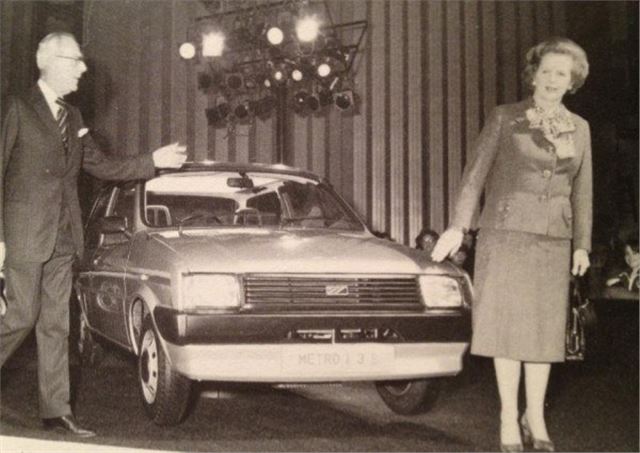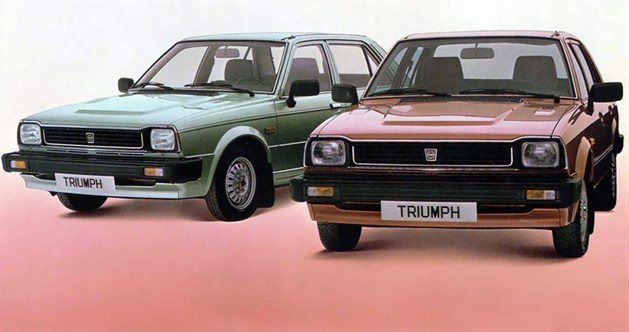Secret documents revealed: The future of BL

De-Classified government documents: The future of British Leyland
We've got our hands on recently de-classified government documents that shows what the newly-elected Conservative administration of 1979 thought of British Leyland and its future. We're serialising the documents in three parts. This first one covers September-December 1979 and runs to 123 pages.
During the 1970s, British Leyland had been through the mill - first with bankruptcy in 1974, followed by the government bail-out in 1975, and then the eternal struggle to keep the company's head afloat in tough times.
In May 1979 the Conservatives swept into power with Margaret Thatcher at the helm - and thanks to the National Archives, we know that BL came very close to being closed just months into the administration change.
The future of BL, part one
 After five years as effectively a nationalised industry (although the government only ever remained a majority shareholder), under a Labour government, the future of BL was always going to to come under intense scrutiny following a government change. And so it proved. Margaret Thatcher was elected by a country that was sick of industrial turmoil - and her determination to stand firm against strikes and the all-powerful unions proved popular.
After five years as effectively a nationalised industry (although the government only ever remained a majority shareholder), under a Labour government, the future of BL was always going to to come under intense scrutiny following a government change. And so it proved. Margaret Thatcher was elected by a country that was sick of industrial turmoil - and her determination to stand firm against strikes and the all-powerful unions proved popular.
But the matter of BL and its future was one of some urgency. Since the Labour government's bail-out of the company in the closing months of 1974, and the subsequent Ryder Report on its future, the government had pumped in around £1bn of taxpayer's money. And this was clearly incompatible with Margaret Thatcher's 'market forces' ideal.
It could be argued that BL's future prospects had looked a lot brighter since November 1977, when Sir Michael Edwardes had been appointed the Chairman and Chief Executive of the company. He immediately set about abandoning the Ryder plan, retrenching a smaller, leaner BL, and returning it to profitability. And that meant savage rationalisation of factories, workers and model lines. He was instrumental in closing the Speke factory near Liverpool in 1978 after strikers had crippled the plant - but he knew many more would need to go in order to match the company's lower build numbers. And to give you an idea - in 1974, British Leyland's market share in the UK was 33%. By 1979, that number had reduced to just under 20%. And export sales had collapsed in pretty much the same way.
But Speke had just been the beginning. More factories would need to close; more jobs had to go. In September 1979, BL chairman, Sir Michael Edwardes, warned Margaret Thatcher that there would be further factory closures, most notably MG at Abingdon. But it was all part of the plan to create that leaner, fitter BL - which would be ready for a further injection of government cash at the turn of the 1980s. Because although the Austin Metro was nearing introduction, there had been a dearth of new models since the arrival of the Rover SD1 in 1976, and with weakening demand, there was little or no profit with which to invest in future model programmes. And Sir Michael Edwardes would be asking for more.
The National Archives reveal that back in September 1978, the then Secretary of State for Industry - Eric Varley - had approached Edwards and his opposite number at Ford - Sam Toy - asking why the British car industry was in such a state, and what could be done to turn things round. They responded that in light of the sheer number of vehicles lost due to industrial action, the end of the 'unofficial strike' would be the first change they would recommend.
One year on, and with this ringing in his ears, the new Secretary of State for Industry, Sir Keith Joseph, reviewed Edwardes' latest union pay claims for BL. Workers were asked to vote for the 1980 Corporate Plan, which incorporated these changes to union working practices, as well as agreeing to 13 full- or partial-factory closures and the loss of 25,000 jobs. And in the lead up to the vote, Margaret Thatcher's policy adviser, John Hoskyns said, 'the result of the ballot will clearly be a material - but by no means the only - consideration, in considering whether to commit further sums of taxpayers' money.'
Michael Edwardes, on the other hand, decided to play hardball, publicly stating that if there wasn't a 'yes' to the ballot, he would not be approaching the government for further funds for new model development. And that would effectively mean the closure of BL.
But, in the run up to the vote, both Margaret Thatcher and Keith Joseph made it clear that even with a 'yes' vote, the government's funding is guaranteed. 'as it might be misconstrued to imply that the government is already pulling back from the prospect of tough decisions on British Leyland.' On 1 November 1979, BL announced that the vote had been a resounding 'yes', with 87.2% of the workers agreeing with Michael Edwardes' tough new plans for the company.
In the wake of the vote, and the government's decision not to automatically give BL a further tranche of cash, it was clear that the government still wasn't convinced about the future prospects of BL. The Chancellor, Geoffrey Howe hypothesised about what would happen to BL in a letter to Keith Joseph: 'You said that they could be about 300,000 job losses in the unlikely event of a complete and permanent closure of BL, and a net loss to the balance of trade of £2.2bn a year. This strikes me as a highly unrealistic hypothesis.
'Parts of BL are profitable and there is no reason why they should not continue in business. Other parts could be run down over a period rather than closed immediately. To the extent that BL loses its previous market share, it must be the case that other British manufacturers will pick up at least some of their business.'
Going further, Keith Joseph continued speculating over the possible ramifications of closing BL rather than agreeing to Michael Edwardes' investment plan. 'The main difficulty about closing BL now is a psychological one and related really to Edwardes' personality and image. I assume that he is better known to the public than many cabinet ministers and very highly regarded. To reward Edwardes' effort and his workforce backing with closure would seem to be a deliberate blow against everything the government is trying to encourage. We can be virtually certain that BL won't fly, yet it would be difficult to close it now in a way which promoted moderation against militancy. We're still in a no-win situation.'
During this, Pat Lowry of BL confirmed that Communist Union convenor and chairman of the Leyland Combine Trade Union Committee, Derek Robinson, had been dismissed on 22 November 1979. This was a decision described as 'encouraging' by Keith Joseph, even if it failed to moderate his sceptical line towards BL, and its chances of future survival.

But the tide of opinion within the cabinet was clearly moving towards closure - or at the very least a break-up - of BL. The BL deal with Honda was in the offing after months of negotiations, and was seen as a very positive step. But it was down to the government to approve it - 'Should BL be allowed to sign-up with Honda on 20 December? The arguments for this are quite strong: it is a way of keeping options open (the cancellation charges if BL pulls out at only £5.5m). But how definite an assurance is needed about government approval for the plan before Honda will be prepared to sign?'
But in the closing days of 1979, Keith Joseph's paper on BL was published, with the Prime Minister's office responding with tacit support for BL - despite the potential pitfalls. 'The choice is stark. Either the government cuts its losses now at a PSBR cost in 1980-'81 of some £1.4bn and 200,000 unemployed; or it finds an extra £130m in 1980-'81 in the hope that BL will struggle through to viability (with a less than 50/50 chance of survival). In his paper, Keith Joseph recommends the second course, in particular the approval of BL's Corporate Plan for the next five years; and the precise limit of 1980 funding to be left to the chancellor'.
There was another issue that encouraged the government to support the corporate plan. 'The need for urgency arises because other BL will lose the opportunity of signing the collaborative deal with Honda, for a new middle-sized car - the LC9 (above as the Triumph Acclaim), which BL plans to assemble from mainly Honda components.'
Part Two will cover December 1979-March 1980, a further 164 pages of documents. A key feature of these papers is the governement discussing Ford's green light for Bob Lutz - then head of Ford of Europe - to buy British Leyland.
Part one of the National Archives report on BL's future prospects, from September-December 1979:
Compare classic car insurance quotes and buy online. A friendly service offering access to a range of policies and benefits.





